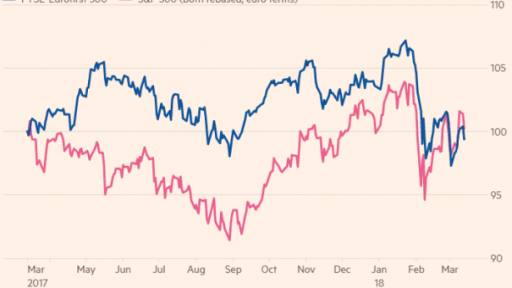- Home
- >
- Fundamental Analysis
- >
- Has the time come to buy European and UK equities – what does the fundamentals shows

Has the time come to buy European and UK equities - what does the fundamentals shows

Here we go again. I am going to suggest that it might be time to buy European equities. And in particular, it might even be time to buy equities from the UK (which is still politically part of the EU).
I have made this argument on a number of occasions in the past, and it has not always worked well. European equities have looked cheap relative to US equities for years now, but there has been good reason for that. But last year you would, contrary to many perceptions, have made more money in European stock markets than in the US. And the moves of the past few weeks have again made Europe look attractive.
To start, here is the gap between the price-to-book multiples on US and European stocks, and how they have changed over time:
There are reasons why the US stock market is more expensive than its European counterpart, but they can mostly be condensed into one syllable: tech. The US has Silicon Valley and the Fang stocks, and Europe does not. Many large US tech stocks are still going through a period of secular growth, so it is natural that the US as a whole should sell at a premium. But why has the premium widened significantly since Europe began to emerge from the eurozone sovereign debt crisis five years ago?
Also, it is noticeable that European equity performance has ground to a halt. While the US has enjoyed the Trump bull market (fuelled in large part by the weak dollar), European equities have suffered from the strong euro, and have been hit harder by the recent volatility:
This is strange because ISM supply manager surveys remain far more positive for Europe than they do for the US. Most tellingly, there is the difference in monetary policy. The US is (very slowly) withdrawing from crisis-era monetary policy. The eurozone, through the European Central Bank, is still buying up assets. As a result the gap between US and German bond yields has widened to a post-eurozone crisis high:
Rising bond yields are widely and probably correctly cited as the key catalyst for the correction in the US. Why then has the correction hit harder in Europe, where stock valuations should benefit from cheap money from the central bank for a while longer?
Politics is one obvious answer. Europe has staged a series of elections that markets found frightening since the US last held a presidential election. But none of the outcomes has been particularly scary. Investors got exactly what they wanted in the Netherlands and (particularly) in France, and Angela Merkel survived in power in Germany. This month’s election in Italy made nobody outside Italy very happy, but it did not come as a great surprise — and in any case, Italian assets have been performing better than most of the rest of the continent. And on top of that, it is not as though the US does not have to deal with some political uncertainty of its own.
All of this suggests that even Europe has been a popular investment for a while, on the grounds of valuation, it might still be an interesting investment. And interest in Europe does appear to be falling a little. European equity allocation is the lowest in almost a year, according to the last BofAML survey of fund managers.
BofAML suggests that this is largely because hopes for profits in the US (aided by the tax cut) and in Japan have now largely caught up with Europe.
It remains clear that those investing in Europe are still doing so in the hopes of strong earnings growth, with many of them expecting growth in double-digits:
Direct questions of fund managers similarly confirmed that profits growth, plus some signs that the eurozone has sorted itself out and made some important structural reforms, remain the things that investors most want to see. Neither of these is anything like certain, and the prospects for eurozone reform have almost certainly weakened following the results of the Italian election (although they look far, far better than they would have done had Marine Le Pen triumphed in France).
This does lead to one last area of concern, which is that investors do remain overweight in Europe, even if they are steadily moving away from that position
That leads to the contrarian opportunity of the moment. If you really want to invest in a country that is seriously out of favour, and has been for a long time, try the UK
Global fund managers have been net underweight in the UK for almost four years now, and dislike for the UK remains almost universal. It is difficult to see how revulsion can proceed much further from here.
Without wanting to revive some of the infuriating arguments about the verdict of the stock market that came up in the first few days after the Brexit referendum, it bears pointing out that as far as the market is concerned the UK stands to lose out terribly compared to the rest of Europe as a result of leaving the EU
Source: Financial Times, Bloomberg Pro Terminal
Jr Trader Alexander Kumanov
 Varchev Traders
Varchev Traders Read more:
If you think, we can improve that section,
please comment. Your oppinion is imortant for us.














